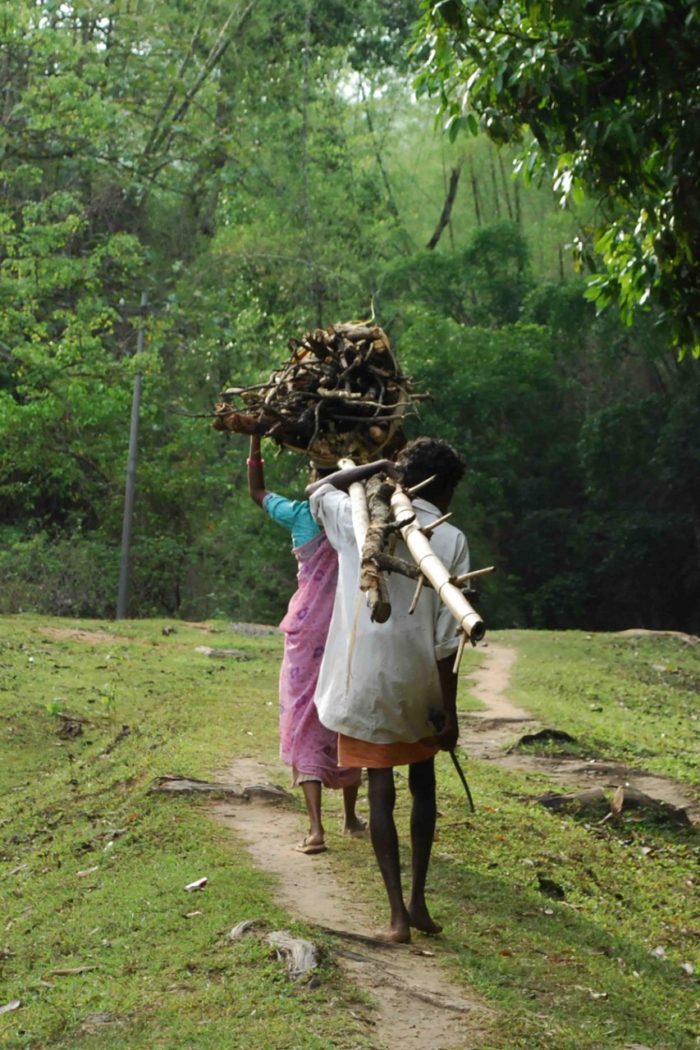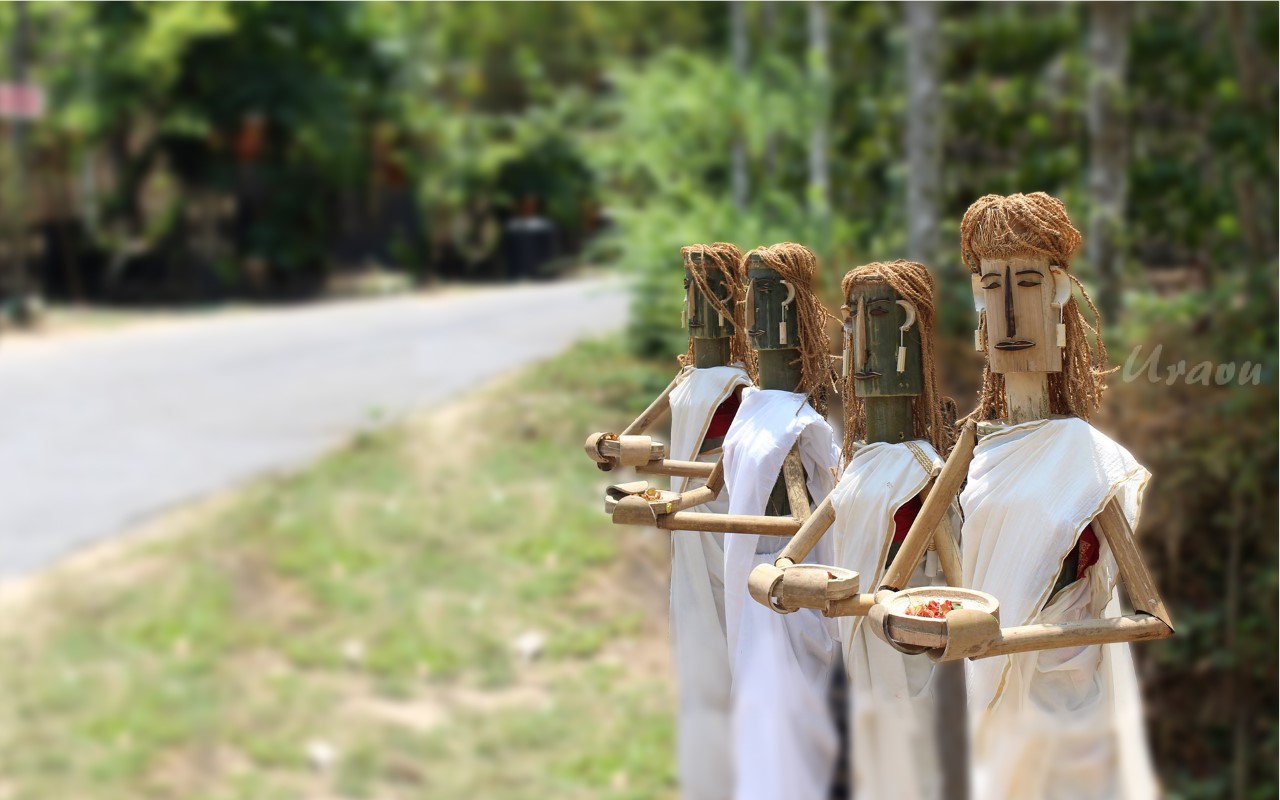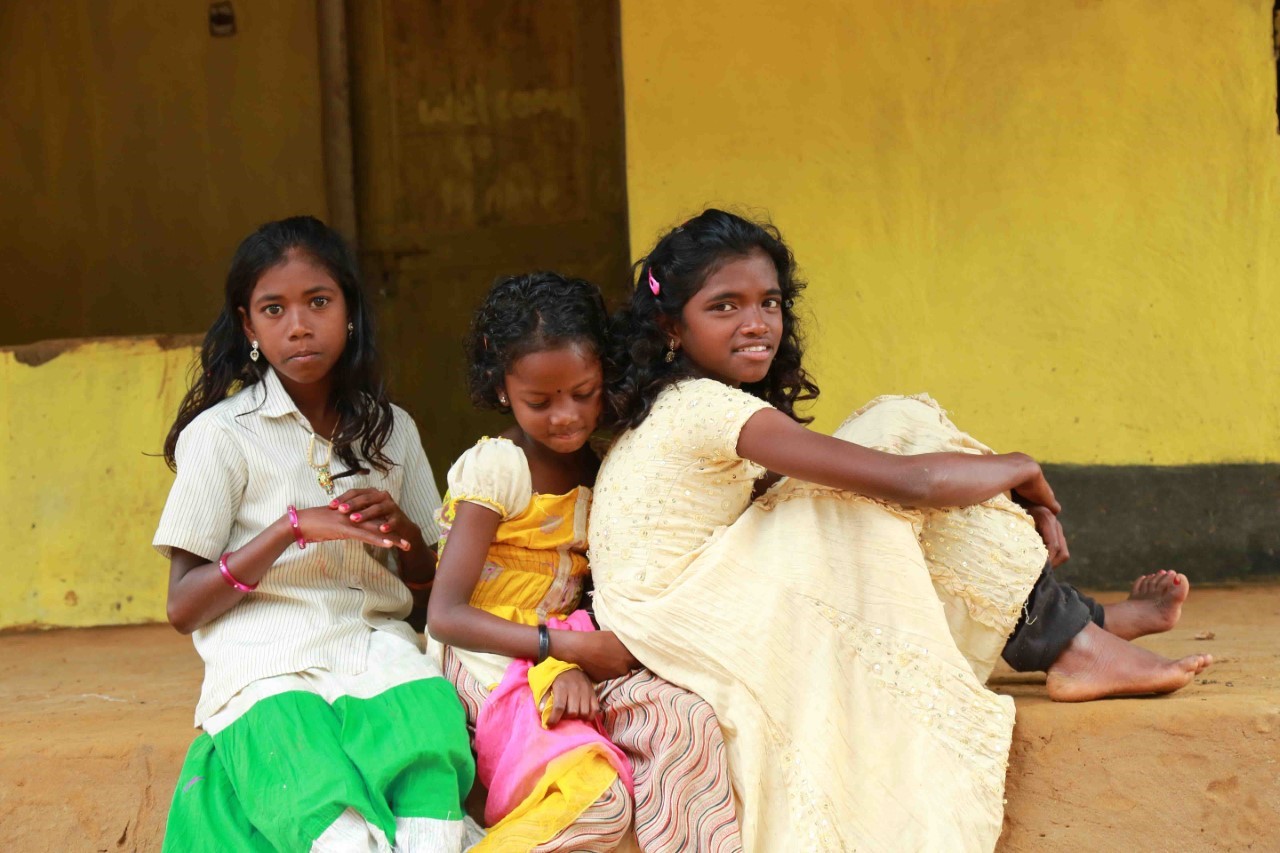Tribal Education Methodology (TEM): Sustainable Education through Heritage and Performance
Tribal Education Methodology (TEM): Sustainable Education through Heritage and Performance was a Phase 2 Large Grant project in India
The project aimed to develop a sustainable curriculum for young people (10-16 years of age) from the indigenous tribes (Adivasis) of Wayanad District, Kerala, India. The project will develop the TEM Toolkit by using tribal heritage, oral and performance traditions through participatory approaches and digital means. The tribal youth are out-of-school, and a proper integration of tribal language and culture into the State syllabus of Kerala has a long way to go. This results the Adivasi education a complex phenomenon in the State causing lack of education, unemployment and poverty among the tribal youth. This is in addition to the ongoing political issue of tribal landownership. The ratification of Indian constitution in 1950s make the State the custodian of tribal homelands making them homeless and landless. To address these issues of the tribal communities in Wayanad and their post-conflict identities, the project will undertake a youth-led Participatory Action Research (PAR) to design a tribal art-based curriculum for empowering transformative learning for advancing education as a way of reducing poverty.
The key activities of the project include:
- Digital documentation of the tribal oral traditions to create a tribal museum and digital archive in Wayanad
- Developing TEM Toolkit for inclusive curriculum, enabling the tribal youth to achieve secondary education
- Setting-up a youth-led, sustainable drama club (Bamboo theatre) to inform the participatory ‘scheme of work’ of the project

Learning in tribal communities is active and embodied. Physical and sensory components such as touch, smell, seeing and hearing inform the pedagogic practice of forest-centred tribal life and hence, learning is understood not only in terms of reading and writing. As a result, education in the tribal context involves “gustatory” terms of bodily learning. A massive body of rituals and oral traditions as well as participatory art practices such as, dance, music and performance dominate not only the tribal way of life but also shape their world-view, historical and cultural memories and formation of their collective self through ‘sensuous scholarship’.
Only a careful integration of art and education will create a sustainable model of tribal education. TEM Toolkit is a solution for the problem and develops new strategies for conflict resolution through cultural means. The use of cultural memory and embodied knowledge will serve as the locus of teaching and learning. Community engagement and participatory processes will inform a new decolonised model of education embedded in indigenous epistemologies.
The impact of TEM includes the partnership with the State Education Board to integrate a sustainable model of education for the tribal youth in Kerala. TEM Museum, and Bamboo Theatre will also equip the young people in the tribal communities to develop new strategies for conflict resolution through cultural means. Beneficiaries include young people in the community; schools in the region and informal education structures like cultural groups and religious affiliations to strengthen a grassroots and bottom-up approach to the development of the curriculum.
________________________________________
________________________________________
Ontu-Nilluva (One Community) is a documentary film consolidating the learning outcomes of the Phase 2 Large Grant project, the Tribal Education Methodology (TEM) located in Wayanad, Kerala, India. Wayanad has the large tribal population in Kerala and the film shows how an art-based participatory action research project like TEM helped shaping and rebuilding the confidence and leadership of the tribal youth learners in Wayanad and reintegrate them into education and community life. Working with the Government of Kerala and led by Dr Sreenath Nair, the TEM project involves a large number of CSOs, NGOs, educators, cultural activists and tribal youth learners to create sustainable impact for the target community.
________________________________________

Photo credit: Sibi Pulppally

Photo Credit: Sibi Pulppally

Photo Credit: Sibi Pulppally

Photo Credit: Shukoor Kalpetta

Photo Credit: Sibi Pulppally

Photo Credit: Uravu

Photo Credit: Sibi Pulpally
Project location
Project location
Resource Archive
Search or browse the resource archive for films, reports, toolkits and other resources produced by the Changing the Story and its commissioned projects. Items relating to India are listed below:
| Title | Summary | Author | Categories | Tags | doc_categories_hfilter | doc_tags_hfilter |
|---|---|---|---|---|---|---|
| Onru Nillava | Tribal Education Methodology (TEM): Sustainable Education through Heritage and Performance is a Phase 2 Large Grant project in India. Watch the final project film, 'Onru Nillava.' | India, Phase 2 | format: film, language: english, SDG 1 Poverty, SDG 10 Inequalities, SDG 17 Partnerships, SDG 4 Education, SDG 5 Gender | india phase2 location | film language-english sdg-1-poverty sdg-10-inequalities sdg-17-partnerships sdg-4-education sdg-5-gender | |
| Dr Smriti Haricharan | Dr Smriti Haricharan was invited to Praxis first Nexus event in Lebanon ' Heritage for Global Challenges' because of their role as Postdoctoral Researcher on the AHRC-GCRF project 'The politics … | Dr Smriti Haricharan, PRAXIS | Event, India, Lebanon | format: film, language: english | event india lebanon location | film language-english |
| Learning to shoot – videography masterclass for the Changing the Story Team, Kohima | Blog (2019/10/14) Learning to shoot – videography masterclass for the Changing the Story Team, Kohima | India, Phase 2, Young Changemakers | format: blog, language: english, subject: reflections | india phase2 changemakers location | blog language-english subject-reflections | |
| 'Striving for Survival (Final)' intro | Striving for Survival is directed by Keduokuolie Pienyii and is being screened as part of the Changing the Story Online Film Festival. | Keduokuolie Pienyii | Event, India | format: film, language: english | event india location | film language-english |
| Mobility Fund Report, 2020 | In 2019, Changing the Story (CTS) launched a Mobility Fund, offering financial support of up to £1000 designed to enhance the mobility and professional development of CTS grantees based in … | Bosnia and Herzegovina, Colombia, India, Nepal, South Africa, Venezuela | format: report, language: english, subject: policy, subject: youth | bosnia-and-herzegovina colombia india nepal south-africa venezuela location | report language-english subject-policy youth | |
| The Big Picture | Blog (2019/04/25) The Big Picture | Chloe Brooks | India | format: blog, language: english, subject: policy | india location | blog language-english subject-policy |
| Historical Research as an Advocacy Tool in India | This is an Accepted Manuscript version of chapter 9 of the book 'Participatory Arts in International Development' published by Routledge/CRC Press on 29 August 2019. The final version of each … | Dakxin Bajrange, William Gould | India | format: article, language: english | india location | article language-english |
| #CTSFilmScreening: Participatory Arts for Health Improvement | Blog (2020/01/23) #CTSFilmScreening: Participatory Arts for Health Improvement | Event, India, Phase 2, Young Changemakers | format: blog, language: english | event india phase2 changemakers location | blog language-english | |
| Deborah Sutton | Dr Deborah Sutton was invited to Praxis first Nexus event in Lebanon ' Heritage for Global Challenges' because of their role as Principal Investigator on the AHRC-GCRF project 'Urban Heritage … | Dr Deborah Sutton, PRAXIS | Event, India | format: film, language: english | event india location | film language-english |
| First Steps in Film-Making | Blog (2019/07/07) First Steps in Film-Making | Event, India, Phase 2 | format: blog, language: english, subject: reflections | event india phase2 location | blog language-english subject-reflections | |
| WPS1 FINAL Post Participatory Arts for the Post Development Era | This first working paper "Post-Participatory' Arts for the 'Post-Development' Era" is co-authored by Professor Paul Cooke and by Inés Soria-Turner. It represents some initial work undertaken during an international seminar … | Inés Soria-Donlan, Prof Paul Cooke | Brazil, India | language: english, SDG 10 Inequalities, SDG 16 Institutions, SDG 17 Partnerships, SDG 4 Education | brazil india location | language-english sdg-10-inequalities sdg-16-institutions sdg-17-partnerships sdg-4-education |
| Project Update: Tribal Education Methodology (TEM) | Blog (2020/07/04) Project Update: Tribal Education Methodology (TEM) | Dr Sreenath Nair | India, Phase 2 | format: blog, language: english, subject: covid19 | india phase2 location | blog language-english subject-covid19 |
| Chief District Administrator (Wayanad District) | Tribal Education Methodology (TEM) is designed to have a meaningful intervention into tribal education and state curriculum of Kerala. Unlike earlier initiatives that promoted alternative educational models that ran parallel … | India, Phase 2 | format: film, language: english, SDG 1 Poverty, SDG 10 Inequalities, SDG 17 Partnerships, SDG 4 Education, SDG 5 Gender | india phase2 location | film language-english sdg-1-poverty sdg-10-inequalities sdg-17-partnerships sdg-4-education sdg-5-gender | |
| Heritage, Mental Health and Wellbeing | Report from PRAXIS & the UK National Commission for UNESCO on Heritage, Mental Health and Wellbeing. The report features key insights, recommendations, and case studies from Dr Karina Croucher, Dr … | Dr Francesca Giliberto, PRAXIS | Heritage Strand, India | format: report, SDG 10 Inequalities, SDG 17 Partnerships, SDG 3 Health and Well-being, SDG 4 Education, subject: wellbeing | heritage-strand india praxis location | report sdg-10-inequalities sdg-17-partnerships sdg-3-health-and-well-being sdg-4-education subject-wellbeing |
| Case Study ‘The Happiness project: Reflecting on my journey’ | Blog (2020/08/11) Case Study ‘The Happiness project: Reflecting on my journey’ | India, Phase 2, Young Changemakers | format: blog, language: english, subject: reflections | india phase2 changemakers location | blog language-english subject-reflections | |
| #CTStakeover : Participatory Arts for Health Improvement in India | Blog (2020/01/03) #CTStakeover : Participatory Arts for Health Improvement in India | Event, India, Phase 2, Young Changemakers | format: blog, language: english | event india phase2 changemakers location | blog language-english | |
| PUBLICATION LAUNCH! Changing the Story: Our Third Year | Blog (2021/05/21) PUBLICATION LAUNCH! Changing the Story: Our Third Year | Aisha Kayani | Cambodia, Colombia, India, Kosovo, Phase 2, South Africa, Young Changemakers | format: blog, language: english, subject: covid19, subject: participatory arts, subject: youth | cambodia colombia india kosovo phase2 south-africa changemakers location | blog language-english subject-covid19 subject-participatory-arts youth |
| Consolidation, Learning and Evaluation in Asia | Project Principal Investigator, Sreenath Nair The South East Asia Consolidated Learning project will work across a selection of the existing CTS portfolio of projects to draw out key lessons learnt, … | Dr Sreenath Nair | Cambodia, India, Malaysia, Nepal, Phase 2 | format: film, subject: reflections | cambodia india malaysia nepal phase2 location | film subject-reflections |
| Participatory Arts for Health Case study | The research project is a collaboration between the University of Leeds and The Kohima Institute and aims to build the research capacity among indigenous young people in the region of … | India, Phase 2 | language: english, SDG 10 Inequalities, SDG 17 Partnerships, SDG 3 Health and Well-being, SDG 8 Work | india phase2 location | language-english sdg-10-inequalities sdg-17-partnerships sdg-3-health-and-well-being sdg-8-work | |
| Tribal Education Methodology Theatre Workshop (extract) | Tribal Education Methodology (TEM) is designed to have a meaningful intervention into tribal education and state curriculum of Kerala. Unlike earlier initiatives that promoted alternative educational models that ran parallel … | Event, India, Phase 2 | format: film, language: english, SDG 1 Poverty, SDG 10 Inequalities, SDG 17 Partnerships, SDG 4 Education, SDG 5 Gender, subject: youth | event india phase2 location | film language-english sdg-1-poverty sdg-10-inequalities sdg-17-partnerships sdg-4-education sdg-5-gender youth | |
| Tribal Education Methodology Co-Researchers and Collaborators | Tribal Education Methodology (TEM) is designed to have a meaningful intervention into tribal education and state curriculum of Kerala. Unlike earlier initiatives that promoted alternative educational models that ran parallel … | India, Phase 2 | format: film, language: english, SDG 1 Poverty, SDG 10 Inequalities, SDG 17 Partnerships, SDG 4 Education, SDG 5 Gender, subject: youth | india phase2 location | film language-english sdg-1-poverty sdg-10-inequalities sdg-17-partnerships sdg-4-education sdg-5-gender youth | |
| Case Study: A State of Mental Wellbeing Through Art | Blog (2020/08/11) Case Study: A State of Mental Wellbeing Through Art | India, Phase 2, Young Changemakers | format: blog, language: english, subject: wellbeing | india phase2 changemakers location | blog language-english subject-wellbeing | |
| Filmmakers from The Kohima Institute: Our Changing the Story journey | Blog (2019/12/19) Filmmakers from The Kohima Institute: Our Changing the Story journey | India, Young Changemakers | format: blog, language: english, subject: reflections | india changemakers location | blog language-english subject-reflections | |
| 'Diary of a recovering drug addict' intro | Raginie Duara introduces the documentary short 'Diary of a Recovering Drug Addict'. | Raginie Duara | Event, India | format: film, language: english, SDG 10 Inequalities, SDG 3 Health and Well-being | event india location | film language-english sdg-10-inequalities sdg-3-health-and-well-being |
| Sharing India’s Hidden History | Blog (2018/02/13) Sharing India’s Hidden History | Abhishek Indrekar | India, Young Changemakers | format: blog, language: english | india changemakers location | blog language-english |
